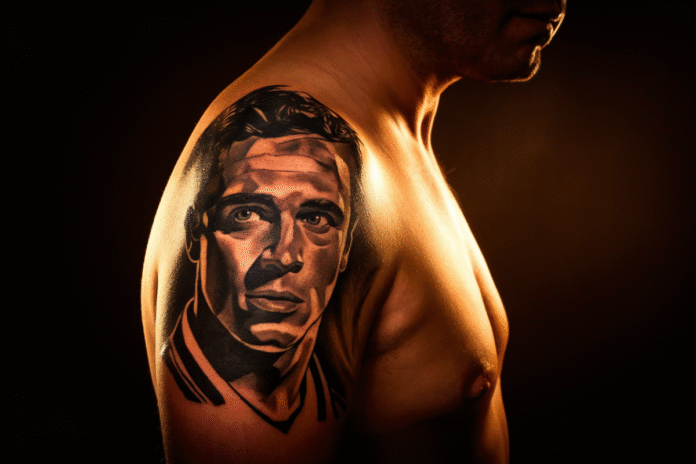“Wish you were here.” This heartfelt message, inked on the skin of Liverpool’s Kostas Tsimikas, serves as a poignant reminder of the bond shared with his teammate Diogo Jota. The tattoo not only memorializes Jota, who has been sidelined due to injury, but it also symbolizes the deep connections forged within a football team. In a sport often characterized by intense competition, such gestures highlight the emotional ties that players develop, both on and off the pitch. As fans and teammates rally around Jota during his recovery, Tsimikas’s tribute shines a light on the importance of camaraderie and support in professional sports.
The tattoo features Jota’s retired number 20, a powerful emblem of his contributions to the team. This act of remembrance comes at a time when Jota’s absence is felt deeply within the squad and among supporters. The emotional weight of this gesture raises questions about the impact of injuries on team dynamics and the role of solidarity in overcoming challenges. Tsimikas’s tribute not only honors Jota’s legacy but also serves as a rallying cry for the team to push through adversity together. How will this bond influence their performance in the upcoming matches?
A Tribute to Friendship and Team Spirit
In the world of football, players often form bonds that transcend the pitch. Kostas Tsimikas’s tattoo is a testament to the friendship he shares with Diogo Jota. Such gestures of loyalty are not uncommon in sports, where teammates often become like family. The tattoo, featuring the message “Wish you were here,” encapsulates the longing for Jota’s presence during matches and training sessions. This sentiment resonates with many athletes who understand the emotional toll of being away from their teammates due to injury.
Injuries can disrupt the rhythm of a team, but they also provide an opportunity for players to demonstrate their support for one another. Tsimikas’s tribute serves as a reminder that, even in challenging times, the bonds forged through shared experiences remain strong. It emphasizes the importance of mental resilience and emotional backing within a team environment. As Liverpool navigates the season without Jota, Tsimikas’s tattoo symbolizes a collective commitment to uplift one another and strive for success despite obstacles.
The implications of such gestures extend beyond individual relationships. They foster a culture of unity and strength within the team, which can be crucial during high-pressure situations. As Liverpool prepares for upcoming challenges, the emotional support represented by Tsimikas’s tattoo may play a significant role in the team’s morale and performance. This bond could be the differentiating factor that propels them toward victory.
The Impact of Injuries on Team Dynamics
Injuries are an inevitable part of professional sports, often leading to significant changes in team dynamics. Diogo Jota’s absence has left a noticeable gap in Liverpool’s lineup, forcing the team to adapt and strategize differently. The emotional toll of losing a key player can be challenging, as teammates must not only fill the void on the field but also manage the psychological effects of their absence. Tsimikas’s tattoo highlights the emotional landscape that players navigate when faced with such challenges.
When a player like Jota is sidelined, it creates an opportunity for others to step up and showcase their skills. This can lead to unexpected performances and the emergence of new leaders within the squad. However, the emotional aspect cannot be overlooked. Teammates may experience feelings of sadness or frustration, making it essential for them to support one another. Tsimikas’s tribute serves as a reminder of the importance of solidarity during these trying times, reinforcing the notion that the team is greater than the sum of its parts.
As Liverpool grapples with Jota’s absence, the team must find ways to channel their emotions into positive energy on the pitch. This might involve rallying around Tsimikas’s heartfelt gesture, using it as motivation to perform at their best. The collective spirit can help the team overcome adversity, transforming a challenging situation into an opportunity for growth and resilience. The tattoo, therefore, stands as a symbol of hope and determination, reminding players to support one another through thick and thin.
Looking Ahead: the Road to Recovery
As Diogo Jota embarks on his journey to recovery, the tattoo from Kostas Tsimikas serves as a beacon of hope for both the player and his teammates. The emotional connection represented by the ink is a powerful motivator, reminding Jota that he is not alone in his struggles. This sense of belonging can significantly impact an athlete’s recovery process, as the support from teammates can boost morale and foster a positive mindset.
In the competitive landscape of professional football, the road to recovery can be arduous. However, knowing that his teammates are rallying behind him may provide Jota with the strength needed to overcome challenges. Tsimikas’s gesture not only honors Jota’s contributions but also reinforces the idea that the team stands united, ready to support one another in times of need. This solidarity can create a nurturing environment that encourages Jota to return stronger than ever.
As Liverpool continues its campaign, the emotional ties within the team will play a crucial role in shaping their performance. The bond represented by Tsimikas’s tattoo may inspire players to push through adversity, reminding them of the power of friendship and support. While Jota’s return remains uncertain, the message behind the tattoo will undoubtedly resonate within the squad, serving as a constant reminder of their collective strength and resilience.


